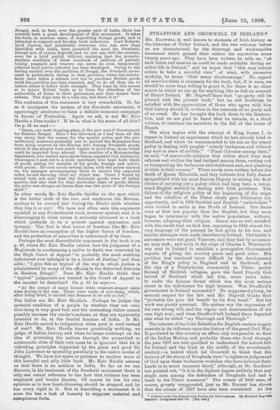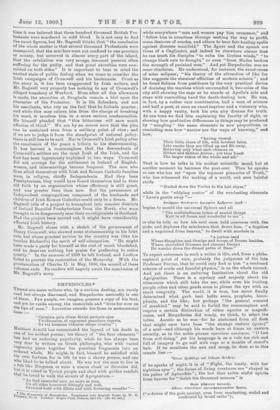STRAFFORD AND CROMWELL IN IRELAND.*
Mn. BAGWELL is well known to students of Irish history as the historian of Tudor Ireland, and the two volumes before us are characterised by the thorough and workmanlike treatment which gained their author his reputation some twenty years ago. They have been written, he tells us, "at such times and seasons as could be made available during an active life in Ireland," and he hopes that "this may induce critics to take a merciful view" of what, with excessive modesty, he terms 'their many shortcomings." No appeal ad misericordiam is necessary for the book, but, if it were, we should be more than willing to grant it, for there is no other source to which we can go for anything like so full an account of Stuart Ireland. Mr. Bagwell fears that "no party will be pleased with the present book," but he will doubtless be satisfied with the appreciation of those who agree with him that history should be written in the interests of no party and of no creed. He has brought the book down to the Restora- tion, and we are glad to know that he intends, in a third volume, to continue his narrative to the fall of the house of Stuart.
The story begins with the attempt of King James I. to repeat in Ireland an experiment which he had already tried in Scotland, and which he recommended to his son as the wisest policy in dealing with peoples "utterly barbarous and without any sort or thew of civilitie." "Plant Colonies among them," he said, "of answerable subjects that within short time may reforme and civilize the beet inclined among them, rooting out or transporting the barbarous and stubborne sort, and planting civilitie in their rootnes." Those words were written before the death of Queen Elizabeth, and they indicate how fully James sympathised with his most famous Deputy in seizing the first chance of carrying out a policy which had long been a recog- nised English method in dealing with Irish problems. The failure of the religious policy of the beginning of the reign and the rebellion of the Ulster chiefs gave Chichester. his opportunity, and in 1609 Scottish and English " undertakers " were invited to settle in the North of Ireland. The Scots were at first less popular than the English, but they soon began to intermarry with the native population, without, however, adopting their religion. James was so well satisfied with the result that we find him repeating in 1615 almost the very language of the precept he had given to his son, and similar attempts were made elsewhere in Ireland. Chichester's successors were not great Viceroys, and they had by no means an easy task; and early in the reign of Charles I. Wentworth was sent to Ireland to establish a prerogative Government capable of giving the country peace and good order. His problem was rendered more difficult by the development of the King's policy in England and in Scotland; and the rise of a Presbyterian community in Ulster, partly formed of Scottish refugees, gave the Lord Deputy that hatred of Scotland. which led him, some years later, to make the famous threat which was the most serious count in his indictment for high treason. Was Strafford's government in Ireland successful? He suppressed piracy, he secured respect for the law, and Mr. Bagwell thinks that "probably the poor did benefit by his firm hand." But his work was purely personal. His system was the expression of his own strong will, and the vigour and determination of his own high soul ; and when Strafford left Ireland there departed also what he called "my Thorough and Thorough."
The interest of the Irish Rebellion for English readers largely consists in its influence upon the history of the great Civil War. It produced in this country an effect only comparable to that of the Indian Mutiny, and probably those who lived through the year 1857 are best qualified to understand the hatred felt for Ireland and the Irish in the middle of the seventeenth century,—a hatred which led Cromwell to think that the horrors of the storm of Drogheda were "a righteous judgement of God upon these barbarous wretches who have imbrued their hands in so much innocent blood," although, as Dr. Gardiner has pointed out, "it is in the highest degree unlikely that any single man among the defenders of Drogheda had had a hand in the Ulster massacre." The events of 1641 were, of course, grossly exaggerated, just as Mr. Forrest has shown that the crimes of 1857 have also been overstated. At the • Ireland under the Stuarts and during the Inters 'patrol, By Richard Barna% London Longmont, mid Co. Lz3s. lista time it was believed that three hundred thousand British Pro- testants were murdered in cold blood, lb is not easy to find the exact figures, but Mr. Bagwell thinks that "the conclusion of the whole matter is that several thousand Protestants were Massacred, that the murders were not confined to one province or county, but occurred in almost every part of the island, that the retaliation was very savage, innocent persons often suffering for the guilty, and that great atrocities were com- mitted on both sides." It is important to bear in mind the excited state of public feeling when we come to consider the Irish campaigns of Cromwell and his lieutenants. Cruel as the story is, it has been exaggerated by Irish writers, and Mr. Bagwell very properly has nothing to say of Cromwell's alleged treachery at Wexford. Even after all due allowance is made, the atrocities at Drogheda remain a blot upon the character of the Protector. It is hi e defenders, and not his assailants, who rely on the fact that he forbade quarter ; and while this may relieve him from the charge of breaking his word, it involves him in a more serious condemnation. He himself pleaded that "this bitterness will save much effusion of blood." We are by no means sure that the plea can be sustained even from a military point of view; and if we are to judge it from the standpoint of national policy, there is still less to be said. Nor is Cromwell's Irish policy after the conclusion of the peace a tribute to his statesmanship. it has become a commonplace that the descendants of Cromwell's settlers are the most Irish of the Irish, and the fact has been ingeniously explained in two ways. Cromwell did not arrange for the settlement in Ireland of English- women, and intermarriage became frequent. The men who thus allied themselves with Irish and Roman Catholic families Were, in religion, chiefly Independents. Had they been Presbyterians, they would have found themselves tied to their old faith by an organisation whose efficiency is still great, and was greater then than now. But the persistence of Independent congregations composed of the husbands and children of Irish Roman Catholics could only be a dream. Mr. Bagwell tells of a project to transplant into remoter districts of Ireland Royalist Presbyterians from the North, who were thought to be dangerously near their co-religionists in Scotland. Had the project been carried out, it might have considerably affected Irish history. .
Mr. Bagwell closes with a sketch of the government of Henry Cromwell, who showed some statesmanship in his Irish rule, but whose greatest service to the country was (like his brother Richard's) the merit of self-abnegation. " He might have made a party for himself at the cost of much bloodshed, and lie deserves nothing but praise for preferring to retire quietly." In the summer of 1639 he left Ireland, and Ludlow failed to prevent the restoration of the Monarchy. With the proclamation of Charles II. in May, 1660, the second of these volumes ends. Its readers will eagerly await the conclusion of Mr. Ba.gwell's story.











































 Previous page
Previous page